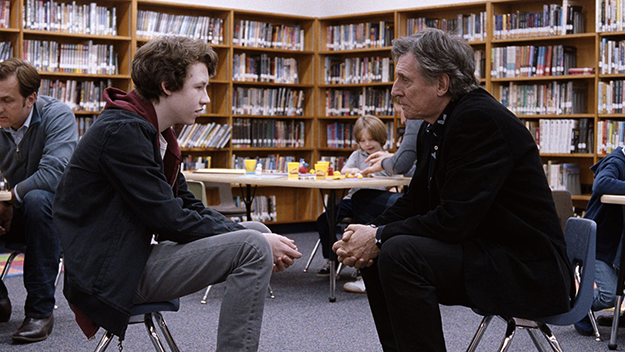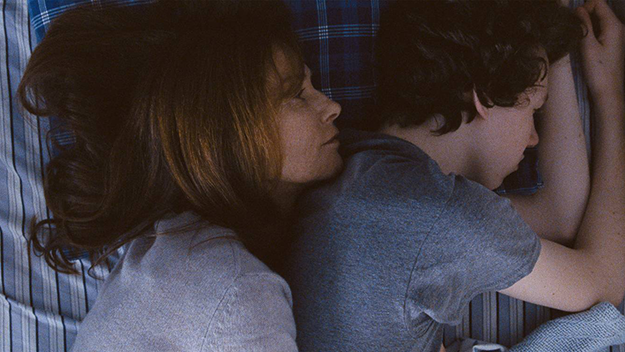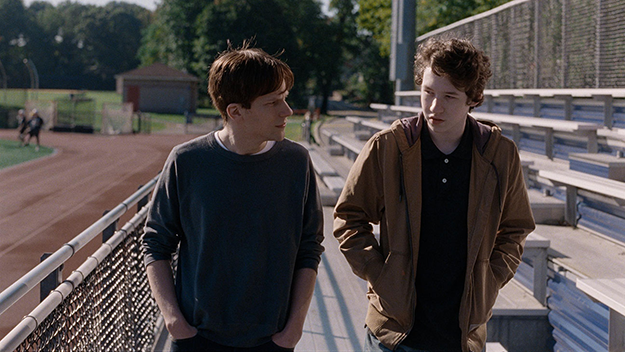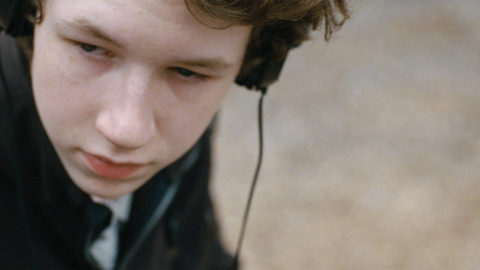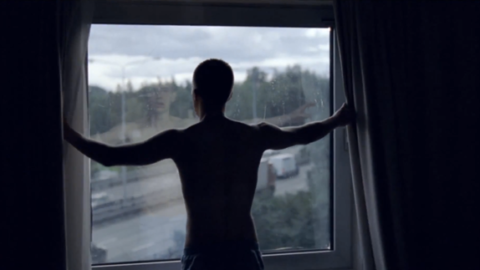Interview: Joachim Trier
Now in theaters, Joachim Trier’s latest film, Louder Than Bombs, tells, in fractured fashion, the story of a family in the aftermath of death. Isabelle (Isabelle Huppert) appears in flashbacks as a war photographer who dies leaving behind a doting husband Gene (Gabriel Byrne) and two sons with varying levels of damage, Jonah (Jesse Eisenberg) and school-age Conrad (Devin Druid). After the tragedy—as in a key image of cheerleaders flying through the air—we spend the film waiting to see where people will land, intact or not. FILM COMMENT spoke with Trier last year at the Cannes film festival shortly after the world premiere of his latest film.
Fragmentation is a big part of your filmmaking. I might not have thought that necessarily after Reprise and Oslo, August 31st, but now it seems central to your technique. With those films, it went with the storytelling—the rapidity of the young writer’s ascent, and the volatility of emotions. In Louder Than Bombs, the fragmentation is a way of giving us some space, giving us a distance, from what is actually rather difficult material.
We’re talking about a fragmented family, and we’re talking about the gaps between humans. It’s a family where the mother was a renowned war photographer, which in itself is one of the most challenging modes of representation we have in our image culture. As Susan Sontag would wonderfully describe: how do we regard the pain of others? How do we deal with other human stories? And then in the same family you also have the sense of Conrad, a 15-year-old with his online life of computer games and fragments from YouTube clips. On one level I’m trying to talk about the human experience of relationships and the challenges between autonomy—in a child breaking away or parents having ambitions, set up against the need for closeness and structure and love in the family. But on the formal level that you’re describing, we’re also trying to talk about the culture of images and representation and interpretation. And I’m trying to find a way that we, in a psychological sense, can get involved in the characters’ interpretation of each other.
The whole film is set up almost like a mystery: what really happened to Isabelle, the mother, when she passed away three years ago? We look at their fragments of memories, associations, dreams, diary notes. I used this with Reprise as well: it’s almost like a scrapbook or sequential structure rather than just a clear linear story. We have one foot in a humanist character drama tradition and another foot in more formal, maybe European approach to montage and the gaps between the images. I was joking with a friend of mine, how would you pitch it, what two films. “Well, it’s Breakfast Club meets Mirror by Andrei Tarkovsky.” And they were like, “Is that possible to combine? That sounds weird.”
It’s a mix that could explode.
You know, you want an explosion. We need to keep a modern pulse in what we do and I don’t think this one is the one-shot, temps mort kind of slow, art-house movie. It’s much more messy, for lack of a better term, and I try to embrace that.
Putting together the fragments of the mother’s history gets interesting because you can see her refracted in her children. Her tendencies as an artist, to be somewhat removed and yet highly sensitive. But there’s also this X-factor of never seemingly quite satisfying people she’s in relationships with, which the children also have in very different ways. Jonah evokes sometimes what an artist does—he’s in life and it’s all happening but he’s kind of also watching it happen.
We’re trying to talk about how families, how the characters, reflect each other. The mother was clearly very ambitious, and looking at her from the surface, from afar, she’s just sort of an icon. Which makes Isabelle Huppert the perfect actress for that. And you can see her oldest son, Jonah, looks up to the notions of success and the idea of the merits of a great career, where the younger son, Conrad, perhaps has taken more of her artistic sensitivity. And it’s revealed he actually has an inner life that much different than what we expect with that character.
He’s simmering for a while—you don’t know what he’s going to do. How did you cast each actor?
I was most nervous about casting Conrad. On paper he’s a pretty interesting character, but who the hell is going to play him? I didn’t want to do what sometimes happens in American movies, the Ralph Macchio way where you get a 25-year-old to play a 15-year-old just because he looks young and has a squeaky voice. I’m more interested in naturalism. So we needed to find a kid. And then we met Devin Druid, who has an incredible face. And we did rehearsals and talked and we saw hundreds of people before we saw him. And then it just went quick. That was him.
He really dives into the adolescent pose. He’s able to do a lot with small expressions and changes in his bearings. So he doesn’t come off as glib, which is another danger.
Yeah, I know, he’s got a real humanity to him. Yet there is trouble and there is an inner life which is rich in his eyes, which is what you’re looking for. Which brings me to Isabelle Huppert, who is able to convey things in the most magical way. I’ve never worked with an actor that changes an image so much when entering it. You know, in the U.S. we shoot with stand-ins and light with them sometimes before we bring the real actors in—and it’s just remarkable how when Isabelle comes and sits in her frame or enters, something happens. There’s skill and craft in it as well, but it’s quite unique.
I come from a tradition of Scandinavian fascination for the close-up and the paradox of the close-up which is that you can both be extremely close in a cinematic close-up and yet often it’s impenetrable. When do they let you in and when don’t they? That’s the actor’s art in cinema. And Isabelle controls those things and sometimes you feel her, other times you’re held on the outside. And subtle stuff. When I’m looking at the rushes, it’s beyond what I could describe.
She has that long, entrancing close-up… It’s like a 30-second master class in transmitting or projecting. It’s pretty amazing.
It’s quite hypnotic. It’s one of the shots in the film that I shot. Jakob Ihre, my wonderful old friend and cinematographer says, you should do this one. He knew what I was after.
How does she approach a shot like that? Being in the moment, staring into the camera apparatus…
She’s very intuitive, she likes to plan and then on the day, let things go. But I also spoke to her a lot about what I think is one of cinema history’s greatest close-ups: The Piano Teacher, the ending, with the knife. We spoke about how they had worked, and then we started discussing what we wanted to convey and she also just experiments—we tried a few things and I played some music and there was some stuff going on. She’s fantastic. After I first got to know Isabelle a few years ago at the Stockholm film festival, we met sometimes in Paris and she was generously looking for a project we could do together. I finally realized that in Louder Than Bombs the mother could be French—there are tons of French photographers that are with Magnum or one of these agencies that live in New York. That’s natural, that’s New York.
Some films these days are made just because you can get one of the five most famous, most commercial actors. This is not that type of movie, thank god. They’re renowned but it’s not about casting up, it’s about casting the right person. Gabriel Byrne is someone I’ve liked for such a long time.
He makes such a great dad here.
Such a fantastic warmth and intelligence, and he wanted to turn upside down the classical patriarchal myth of the stern, authoritarian father and do a modern father portrait. And yes, I haven’t denied it, I’m inspired also by Ordinary People. I think that Donald Sutherland is a wonderful dad, a different dad than what Gabriel does here. I’m interested in the emotional man—the allowance of a more modern approach to what male heroism is. Gene is a bit of a hero, actually. He can’t show the great career as an actor he might have dreamt of but he relates to situations, he goes into emotional responsive situations. And the everyday heroism is what I find fascinating in cinema: how he can go close to something and make the smaller pains of everyday life, show it as the drama it is, which is sometimes tremendous.
But at the same time, you do dive into portraits of people who are at a certain extreme. It’s everyday life for them, but still they’re at a certain extreme: for example, Oslo is one of the better movies I’ve seen about depression, and Reprise has elements of that too. And Louder Than Bombs could be a much earlier stage of either of those movies in some ways. The kids especially, being very talented but also having these seeds of vulnerability that are hand in hand with their talent.
In a way you could say that Jesse’s character is very much that type, the ambitious young man who somehow is unresolved with his identity himself. I think that the relation of the brothers is really dear to me in this story—how siblings give you a companion in breaking free from your parents, which is why it’s a blessing sometimes to have siblings as well. In that process of finding autonomy, with siblings there are others around you that have a comparable experience with these people that are our parents who we need to accept, maybe forgive, or also accept to not be so close to.
It’s a double-edged thing. I don’t know anyone who hasn’t had to on some level to deal with the disillusionment of looking back at your childhood and understanding the complexity of yourself as a child that you might not have experienced. That’s an ongoing thing and it goes straight into the idea of memory and identity that I think this film is about. You have to reevaluate your childhood, you have to accept your parents or even rediscover your parents sometimes, which is both incredibly destabilizing as a human being but hopefully can be freeing. That’s what the story plays around with.
But I just want to finish about Jesse… Ideally I want an actor to be a human being who’s revealing himself in a part—that’s kind of the director’s dream. And in this role Jesse has actually shared vulnerable sides that you don’t see in all his movies.
Yeah, often with his roles, the anxiety is kind of amusing or appealing.
Fantastic, kind of charming and funny.
But here there’s a sense that he’s quietly at the edge of a cliff.
That’s real drama. He’s great.
Going back to the sibling relationships, it felt like you were talking a bit from personal experience.
Absolutely, I have a brother and sister and I’m the oldest one. I don’t think this places me biographically into the film in any way. I think I need to identify, together with Eskil Vogt who I write with, with all the characters in a sense, or understand or connect with them.
But I come from a bit of a strange film family. My grandfather Erik Løchen had his first film The Hunt in main competition at Cannes in 1960 alongside Bergman, Antonioni, Fellini, Vincent Minnelli, and Buñuel. Little Erik Løchen from Norway was invited with his fantastic little film The Hunt. He only made two films, The Hunt and Remonstrance. And my dad does sound for movies, and my mom’s done documentaries and works in news. My brother makes documentaries, and my little sister is a still photographer and went to Parsons in New York. So it’s a family concerned with pictures, images. It came in the blood.
With my granddad, it’s a strange coincidence, because I’m here at Cannes. The moment you screen your film, it actually becomes real—this is a marvelous place to screen movies. My grandfather passed away when I was nine, so I never got to talk to him about his experience here, but I thought about him the last week. He was in the Norwegian resistance against the German invasion during the war, and he was incredibly traumatized by it. He was in a work camp and he barely survived, and it affected him for the rest of his life. And then he became a jazz musician for a while, and then he was very interested in free-form. And he was very political: he didn’t want there to be any totalitarian thought in the world, he was about fragmentation and experimentation. He started reading the nouveau roman, new novels from France, and then he wanted to be a filmmaker, and he made a Nouvelle Vague film in Norway without knowing anything about Godard, Truffaut. The French saw it, and invited The Hunt—it’s charming, it’s got jazz music, it’s black-and-white, it’s got a voiceover that’s like: “Who are these people? What is this place?” It’s very sweet, it’s a bit innocent, a little bit corny, but also incredibly ambitious and beautiful in many ways.
There wasn’t an infrastructure in Norway at the time, so he wasn’t able to really sustain a career, and he ended up contributing to creating the political financing system for movies that I’ve contributed from. So, it’s kind of a full circle, I’m back here where he started.



